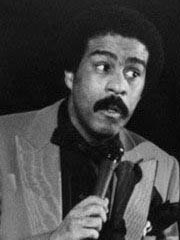
Richard Pryor | Redd Foxx | Flip Wilson | Dick Gregory | Bill Cosby | Eddie Murphy
Richard Pryor

Richard Franklin Lenox Thomas Pryor (born December 1, 1940 - December 10, 2005) is an American comedian and actor.
A gifted storyteller known for unflinching examinations of race and custom in modern life, Pryor shattered many barriers for Afriacn American stand-up comedians. Though he frequently used colorful language, vulgarities, as well as racial epithets (such as "nigger "), he reached a broad audience with his trenchant observations. Pryor is often ranked among the best stand-up comedians.
Pryor was at his best when he took the tragic events that happened during his life and made them a part of his on stage routine in concert movies and recordings such as "Richard Pryor: Live & Smokin'" (1971), "That Nigger's Crazy" (1974), "Bicentennial Nigger" (1976), "Richard Pryor: Wanted – Live In Concert" (1979) and "Richard Pryor: Live on the Sunset Strip" (1982).
Early career
Early in his career, Pryor was a more middlebrow, nonthreatening comic in the Bill Cosby tradition. The first five tracks on the 2005 compilation CD Evolution/Revolution: The Early Years (1966-1974), recorded in 1966 and 1967 capture Pryor in this embryonic stage.
In September 1967, Pryor had what he called in his autobiography Pryor Convictions an "epiphany" when he walked onto the stage at the Alladin Hotel in Las Vegas (with Dean Martin in the audience), looked at the sold-out crowd, said over the microphone"What the fuck am I doing here?", and walked off the stage. Afterward, Pryor began working at least mild profanity and the word nigger into his act. His first comedy recording, the eponymous 1968 debut release on the Dove/Reprise label, captures this particular period, not long after that breakdown.
Mainstream success
In 1969, Pryor moved to Berkeley, California , where he immersed himself in the counterculture and rubbed elbows with the likes of Huey P. Newton and Ishmael Reed. He signed with the comedy-centric independent record label Laff Records in 1970 and recorded his second album, Craps (After Hours). Not long afterward, Pryor sought to get a deal with a larger label, and after a protracted period of time, signed with Stax Records. His third, breakthrough album, That Nigger's Crazy!, was released in 1974 and was almost sued out of existence by Laff, who claimed ownership of Pryor's recording rights. Negotiations led to Pryor being released from his Laff contract in exchange for the small label being allowed to release previously unissued material recorded between 1968 and 1973 at their leisure.
During the legal battle, Stax briefly closed its doors. Pryor then resigned with Reprise/Werner Bros., who immediately rereleased That Nigger's Crazy!on the heels of his first album under his new Reprise/Warner Bros. deal,...Is It Something I Said? With every successful album Pryor recorded for Warner Bros. (or later, his concert films and his 1980 freebasing accident), Laff would turn around and rush out a hastily-compiled, badly packaged album of old material to capitalize on Pryor's growing fame - a process the label would undertake until 1983.
Comfortably successful and into the zenith of his career, Pryor visited Africa in 1979. Upon returning to the United States, Pryor swore he would never use the "N" word in his stand-up comedy routine again. (His favorite epithet, "motherfucker", remains a term of endearment on his official website to this day.)
Pryor appeared in several popular films including Lady Sings the Blues , The Mack , Uptown Saturday Night , Silver Streak, Which Way is Up? , Car Wash , The Toy , Superman III , Brewster's Millions, Stir Crazy , Moving, See No Evil, Hear No Evil and Blue Collar . In four of his films, he co-starred with Gene Wilder. He also co-wrote Blazing Saddles directed by Mel Brooks and starring Gene Wilder. Pryor was to play the sheriff in "Blazing Saddles", but the film's producers were unsettled by his vulgarity and Mel Brooks chose Cleavon Littleinstead.
The freebasing incident and its aftermath
On June1,1980, Pryor set himself on fire while freebasing cocaine. Pryor made this part of his heralded "final" stand up show "Richard Pryor Live On Sunset Strip" (1982). After joking that the incident was actually caused when he dunked a cookie into a glass containing two different types of milk, he gave a poignant yet both funny and serious account of his accident and recovery, then poked fun at people who told jokes about it by waving a lit match and saying "What's this? It's Richard Pryor running down the street." Interviewed in 2005, Jennifer Lee Pryor said that Richard poured high proof Rum over his body and torched himself in a drug psychosis. In a TV interview during his recovery Pryor said that he tried to commit suicide.
He didn't stay away from live stand-up too long, though - in 1983 he filmed and released a new concert film and accompanying album, Here and Now, which he directed himself. He then wrote and directed a fictionalized account of his life, Jo Jo Dancer, Your Life is Calling.
In 1986, Pryor announced that he suffers from multiple sclerosis. In 1992he gave some final live performances, excerpts of which appear on the ...And It's Deep Too! box set.